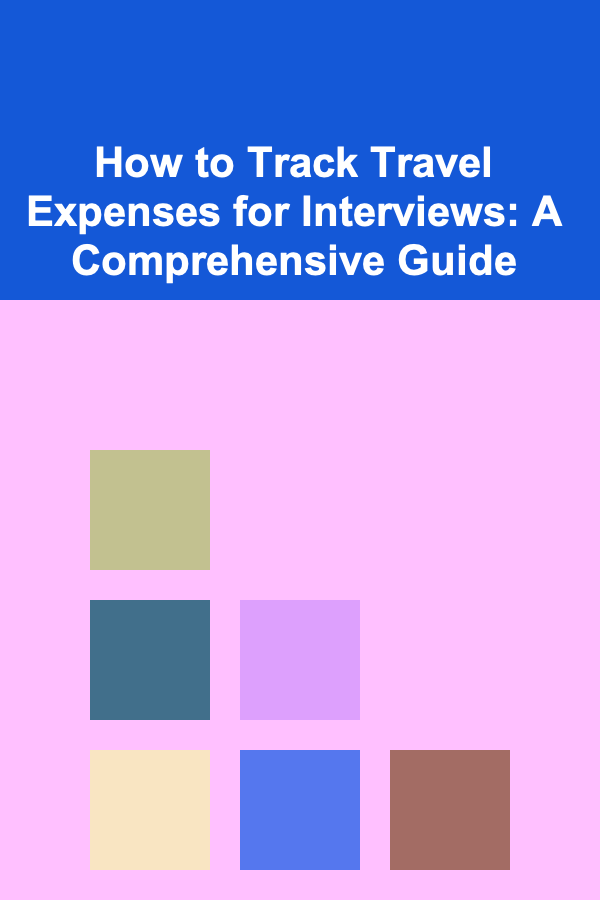
How to Track Travel Expenses for Interviews: A Comprehensive Guide
ebook include PDF & Audio bundle (Micro Guide)
$12.99$8.99
Limited Time Offer! Order within the next:

Traveling for interviews can be an exciting and nerve-wracking experience. Whether you're flying to another city for a job opportunity or driving across town for an in-person interview, managing your travel expenses is a crucial aspect of ensuring that the process remains organized and cost-effective. Many candidates struggle to keep track of their travel expenses, and failing to do so can lead to unnecessary stress and confusion.
In this comprehensive guide, we will explore how to track travel expenses for interviews, offering practical tips, tools, and strategies to help you stay organized. From understanding the types of expenses you may encounter to effectively documenting and reporting them, this guide covers everything you need to know.
Understanding the Types of Travel Expenses
Before you dive into tracking your expenses, it's essential to understand the different types of costs that may arise during your interview travel. Travel expenses can vary depending on the nature of the interview, the location, and the duration of your trip. Below are some common expenses you may encounter:
Transportation Costs
- Flights or Train Tickets: If you're traveling to a distant location, flight or train tickets are likely your most significant expenses.
- Bus or Taxi Fares: Local transportation such as buses, taxis, or ridesharing services like Uber and Lyft may be necessary for getting to and from the interview.
- Car Rental: If you're traveling by car and need a rental to get around, this cost should be accounted for.
- Fuel Costs: If you're driving your own car, you'll need to track the cost of gasoline and tolls.
- Parking Fees: Don't forget to factor in parking fees, whether you're parking at an airport, a hotel, or at the interview location.
Accommodation Expenses
- Hotel Stays: If your interview requires an overnight stay, you'll likely need to book a hotel room. Keep track of any hotel charges, including parking fees, Wi-Fi, or resort fees.
- Airbnb or Short-Term Rentals: If you prefer to stay in a home rental, be sure to include the cost of these types of accommodations in your tracking.
Meal Costs
- Meals and Snacks: Traveling for an interview may involve meals outside of your normal routine, including breakfast, lunch, dinner, or snacks during your trip. These costs can add up, especially if you're traveling for more than one day.
Miscellaneous Costs
- Visa Fees: If your interview is overseas, you may need to factor in the cost of obtaining a visa or any necessary permits.
- Luggage Fees: If you're flying, be sure to track any baggage fees, including checked luggage and carry-ons.
- Internet and Communication Costs: In some cases, you may need to pay for temporary internet access or phone calls, especially when traveling internationally.
Setting Up a System for Tracking Expenses
Once you have a clear understanding of the types of expenses that may arise, the next step is to set up a reliable system to track them. This will ensure that you don't lose track of any costs and can easily calculate your total expenses when the trip is over. Below are some practical options for tracking your travel expenses.
Manual Tracking with a Spreadsheet
One of the simplest ways to track your expenses is by creating a spreadsheet. You can use programs like Microsoft Excel or Google Sheets to set up a document that lists each expense and its category. Here's how to structure your spreadsheet:
- Column 1: Date of Expense
- Column 2: Expense Type (e.g., transportation, accommodation, meals, etc.)
- Column 3: Description (e.g., "Flight to NYC," "Taxi from airport to hotel")
- Column 4: Amount Spent
- Column 5: Payment Method (e.g., credit card, cash, etc.)
- Column 6: Receipt Attached (for tracking whether or not you have receipts)
Using Mobile Expense Tracking Apps
There are various mobile apps designed specifically for tracking expenses, including travel expenses. These apps allow you to easily record costs as they occur, upload receipts, and categorize your expenses. Some popular apps for tracking travel expenses include:
- Expensify: This app automatically scans and logs receipts, allowing you to track your spending in real-time. You can categorize each expense and export the data into reports.
- TravelBank: TravelBank helps you manage your travel budget, track expenses, and even book flights and hotels directly through the app.
- Concur: Often used by businesses, Concur can track expenses, upload receipts, and help organize your travel spending.
- Wally: A simple app to track expenses and create detailed expense reports.
Dedicated Travel Expense Tracker Tools
If you find yourself frequently traveling for interviews or work, it might be worth investing in a dedicated travel expense tracker tool. These tools often come with features tailored to business and interview travel, such as integration with accounting software and automatic expense report generation. Some tools to consider include:
- Triplog: Triplog is an excellent option for those who want to track mileage and car-related expenses. It can automatically track your trips and calculate the cost of fuel and other travel expenses.
- Zoho Expense: Zoho Expense allows users to log and track travel expenses, categorize them, and generate expense reports for reimbursement or tax purposes.
Keep Track of Receipts
Receipts are vital for verifying your travel expenses and ensuring you have accurate documentation for reimbursement or tax purposes. Always try to collect receipts for any major expenses, including transportation, accommodations, and meals.
Tips for Managing Receipts
- Digitize Your Receipts: Using your smartphone camera, take photos of all your receipts as soon as you receive them. This will help you avoid losing them and allow you to easily upload them to your tracking system or expense app.
- Keep a Folder or Envelope: If you prefer physical receipts, keep them organized in a folder or envelope. Label the folder by date or category (e.g., "Interview Travel March 2025") for easier reference.
- Use Email Receipts: Many airlines, hotels, and rental services now send email receipts. Be sure to save these emails or download them to a designated folder on your computer or cloud storage.
Categorize Your Expenses
As you track your expenses, it's crucial to categorize them for clarity and easy reporting. Categorizing expenses also helps you identify areas where you may be able to cut costs in the future. Common categories include:
- Transportation: Includes flights, taxis, rental cars, buses, and gas for personal vehicles.
- Accommodation: Hotels, Airbnb rentals, or other lodging costs.
- Meals: Food and drinks, whether dining out or grabbing snacks during travel.
- Miscellaneous: Any additional expenses such as parking fees, luggage fees, visa costs, or tips.
By categorizing your expenses, you'll be able to better understand your spending patterns and identify areas for potential cost-saving.
Track Currency Exchange and International Expenses
If you're traveling internationally for an interview, currency exchange rates can complicate your tracking process. Different currencies, conversion fees, and the fluctuation of exchange rates all come into play. To keep track of international expenses:
- Track in Local Currency: When you make a purchase in a foreign country, keep a note of the cost in the local currency and the date of the transaction.
- Currency Conversion: Use a reliable currency conversion tool or app to convert your expenses into your home currency. Apps like XE Currency and Revolut can help you track conversion rates in real-time.
- Document Exchange Fees: If you're exchanging money, be sure to keep track of any fees associated with currency exchange.
Budgeting for Interview Travel
Establishing a budget for your interview travel is key to ensuring you don't overspend. Setting a budget beforehand allows you to make informed decisions and find cost-effective ways to travel. To create a travel budget:
- Estimate Costs: Research your expected travel expenses, such as transportation, accommodation, meals, and miscellaneous costs. Use historical data or online resources to estimate these costs based on the location and time of year.
- Set a Maximum Limit: Determine the maximum amount you are willing to spend on each category of expenses. This will help you make decisions if your costs start to exceed your expectations.
- Allow for Flexibility: Keep in mind that unforeseen expenses may arise. It's wise to set aside a small buffer to account for unexpected costs.
Reimbursement Options for Interview Travel
If the company you're interviewing with has a policy of reimbursing travel expenses, it's important to understand the details of their reimbursement process. Some companies may reimburse you for all or part of your expenses, while others may only cover certain types of costs.
What to Keep in Mind
- Inquire About Reimbursement Policy: Before booking any travel, ask the company about their reimbursement policy. Are they willing to reimburse flights, hotel stays, meals, or other expenses? Make sure you understand what is covered.
- Retain Detailed Records: Keep a record of all your expenses and receipts, as companies will require documentation to process any reimbursement requests.
- Submit a Reimbursement Form: Many companies require you to submit a formal expense report or reimbursement form. Ensure that your form is completed accurately and submitted on time.
Tax Deductions for Interview Travel
In some cases, interview travel expenses may be deductible on your taxes. However, tax laws vary depending on your country and specific circumstances. For example, in the U.S., travel expenses related to job interviews may be deductible as long as the interview is not in your current location and is related to seeking employment.
Tax Considerations
- Eligible Expenses: In general, expenses for transportation, lodging, and meals related to job interviews may be deductible.
- Keep Detailed Records: To claim deductions, you'll need to keep detailed records of your expenses and receipts.
- Consult a Tax Professional: If you're unsure about whether your expenses qualify for deductions, consult with a tax professional to ensure you're taking advantage of any available tax benefits.
Conclusion
Tracking travel expenses for interviews is essential for staying organized, adhering to your budget, and ensuring that you're reimbursed or eligible for tax deductions. By understanding the types of expenses involved, setting up an effective tracking system, and keeping detailed records, you'll ensure that your travel experience remains as stress-free and financially sound as possible. With the right approach, you can focus on what matters most -- acing the interview and advancing your career.
Reading More From Our Other Websites
- [Trail Running Tip 101] Seasonal Secrets: How to Trail Run Safely Through the Woods All Year
- [Paragliding Tip 101] From Rookie to Champion: A Step‑by‑Step Guide to Competing in the Paragliding World Championships
- [Stamp Making Tip 101] From Block to Print: Step-by-Step Techniques for Mastering Linoleum Stamp Making
- [Trail Running Tip 101] Best Trail‑Specific Nutrition Bars That Won't Crumble on Rocky Descents
- [Home Budget 101] How to Create a Budget for a New Home Purchase
- [Home Cleaning 101] How to Sanitize Your Kitchen After Cooking
- [Home Lighting 101] How to Make Your Home Feel Warm and Inviting with Lighting
- [Organization Tip 101] How to Set Goals for Each Learning Session
- [Organization Tip 101] How to Refresh Outdated Furniture for Staging
- [Organization Tip 101] How to Choose Furniture that Encourages Relaxation

Create and Sell Deep Learning Solutions for Recurring Revenue
Read More
How to Incorporate DIY Wall Decor into Your Budget-Friendly Home
Read More
How to Practice Energy Healing Techniques
Read More
How to Save Money on Furniture and Home Appliances
Read More
How to Stage a Home with Pets for Buyers
Read More
How to Use Animal-Assisted Therapy
Read MoreOther Products

Create and Sell Deep Learning Solutions for Recurring Revenue
Read More
How to Incorporate DIY Wall Decor into Your Budget-Friendly Home
Read More
How to Practice Energy Healing Techniques
Read More
How to Save Money on Furniture and Home Appliances
Read More
How to Stage a Home with Pets for Buyers
Read More